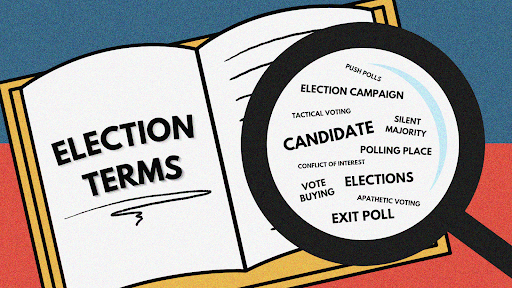Important Election Terminologies

The Philippines is a Republic and Democratic government. Nowadays, some people are clueless about what kind of government our country has. These common misunderstandings and/or ignorances toward politics may cause detrimental results to our society. Simply not knowing political terminologies has the chance to spread fake news and cloud others’ beliefs. Indeed, one may include themself in a political conversation and obliviously damage their principles by supporting who they are not—all because the wrong terms were used. This article contains significant yet simple political terms for education and emphasizes the significance of involving oneself in these topics. Note that these words have power and can make a difference in how the Philippines, and other countries, handle politics.
To make it all clear, republicanism is similar to democracy wherein they abide by the saying, “for the people, by the people.”. However, a republic requires a collective of representatives chosen by the people for the laws to be made, instead of the whole population being given a chance to vote and make the majority determine the law (democracy). These representatives give the chance to protect the minorities in the country, which democracy does not offer in a society (Longley, R. 2020).
The following are basic terminologies to properly understand any political conversation a person may encounter. It will also help someone navigate themself when it is their time to vote and participate in other political deeds. The term (1) candidate simply refers to the individual running for a position in the government. For example, he or she is one of the candidates running for President in the coming 2022 elections. The (2) election campaign is the period of time where candidates influence registered voters for their vote by participating in interviews, debates, etc. Then, (3) elections are days when people finally cast their votes. When voting, expect an (4) exit poll in the many discussions when elections are over. It is a small percentage calculated when voters leave the (5) polling place, where people write down their votes privately to report the election’s status. It also provides the opportunity to acknowledge the reasons behind every vote.
Beware of (6) push polls during elections. A push poll is a form of marketing where candidates will try their best to influence many people to vote for them. Here lies the argument between ethicality and necessity. Is it necessary to ensure people vote for the candidate even if those acts may be unethical? These situations are way more common to get into than one may think. Being aware of this term moves an individual to be attentive and cautious not just to what they may say, but to what any candidate may. They may do multiple things to push the polls, and being conscious of these manipulations/influences will help immensely in one’s way of judgment. A (7) conflict of interest tends to be common in political discussions or arguments, especially online. Therefore, it should be known that these occur when a person cannot decide between multiple potential interests.
These common political scenarios must urge the public to learn that these circumstances will affect the results of the election and/or information regarding candidates, etc. There are common political scenarios and acts that the public may need to be aware of since these situations will affect the election results and the information regarding the election or the candidates. Some scenarios are looked down upon or illegal, which will provide some insight into what should be avoided overall.
The phrase (8) Tactical Voting refers to a technique where people vote for another candidate rather than their preferred nominee. This may transpire if the person has doubts regarding their preferred candidate or if the voter believes that an undesirable outcome may result from voting for who they favor. Similarly, the term (9) Apathetic Voting also revolves around voting, and may negatively affect the election results. Apathy in voting is when a voter is disinterested in the country’s political situations, which will be harmful to the country’s future. It may also be a psychological circumstance where the voter will either decide not to vote, or vote disingenuously because they believe their vote is barely important in the grand scheme of things. When this occurs, potential progressive candidates may be undermined because of the voter’s lack of commitment or motivation. Additionally, this concept adds a sense of randomness to the election process since people are not voting truthfully. The (10) Silent Majority is a large group of people who do not publicly express their political ideologies. Misrepresentation of data when generalizations for a group/place may occur if a silent majority is present; the sample size present in the data collection does not fully reflect the majority of the political stances in the area. It may also mislead potential candidates or the public about the general opinions concerning certain political figures, ideas, or events.
An illegal political practice usually located in the campaigning process is (11) Vote Buying. This is a type of political manipulation that a candidate or other people can implement during the election period. The term covers the idea of these individuals using bribery (predominantly money) to sway voters in a different direction. If this occurs, people can be controlled into voting for an incompetent candidate, or one that does not align with their personal beliefs. Furthermore, the promises of the candidate may never be fulfilled, and people will not have the power to receive the promised items. (12) Abstained votes are what many may already know in school elections. However, not a lot of people may be aware that there are two types of abstained votes. (12.1) Active abstention is when a person has made the conscious effort to vote for a candidate deemed capable for their running position but ultimately believes that none of them are, thus, voting for nobody. (12.2) Passive abstention refers to a person making no effort, although registered to vote, to cast a definite vote online or face-to-face.
Illegal or detrimental practices present during the elections may inevitably negatively impact the country in the future, so it may be best to stray away from them.
This article is to get one ready for the upcoming 2022 elections, and if not old enough, one will be aware enough to vote when one can. Moreover, it is important to know these terms even if one may consider themselves political or not– it is inevitable to avoid these kinds of conversations. Using these terms will not only make one sound smarter, but they will be able to educate themselves and others about how society’s struggles can be fixed by voting with an ethical, moral mindset. One will be more aware of the possibilities they have. For instance, to change one’s livelihood and the others around them simply by acknowledging politics. By doing this, others will also realize how important it is to be part of political deeds– and not just in the Philippines. This knowledge will motivate many to converse about political topics, and most importantly, spread awareness about political, societal, & economic issues. Every choice a person makes affects the world through the knowledge they gain.
Reference List:
Longley, R. (2020, November 2). Republic vs. Democracy: What Is the Difference? ThoughtCo.
POLYAS Election Glossary. (2016, July 8). Polyas.com. https://www.polyas.com/election-glossary





